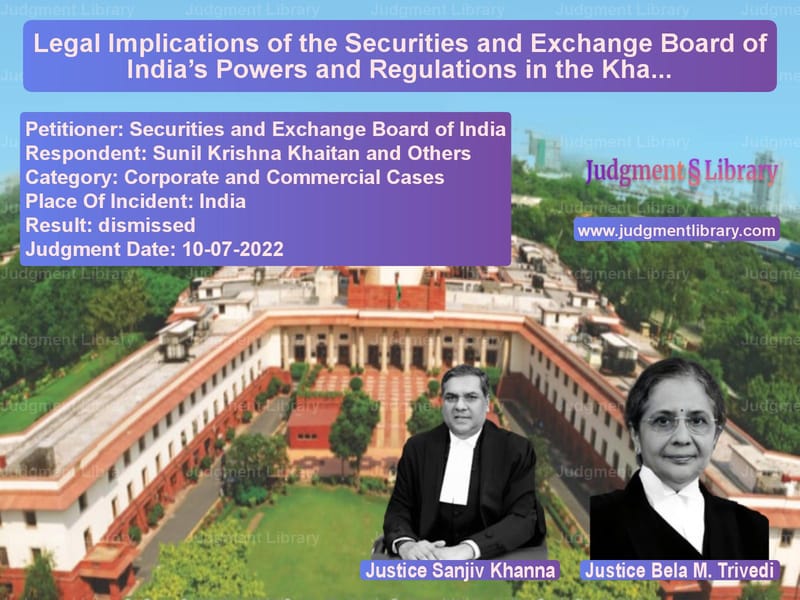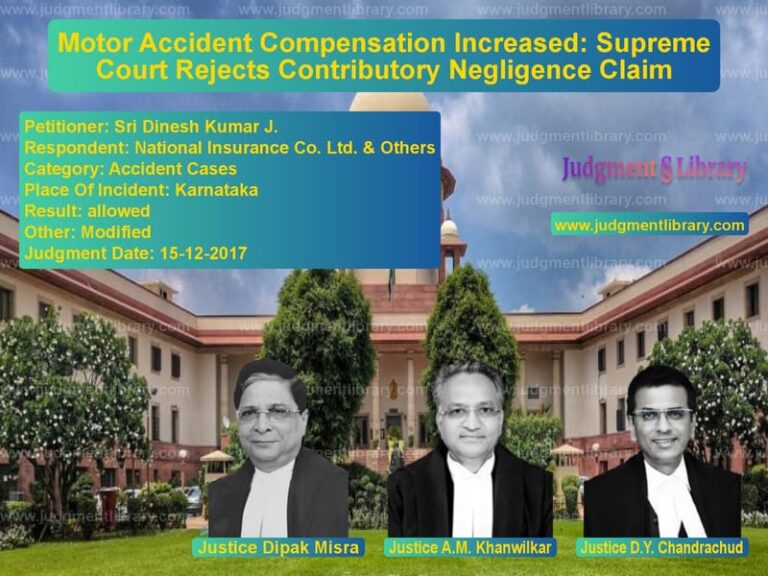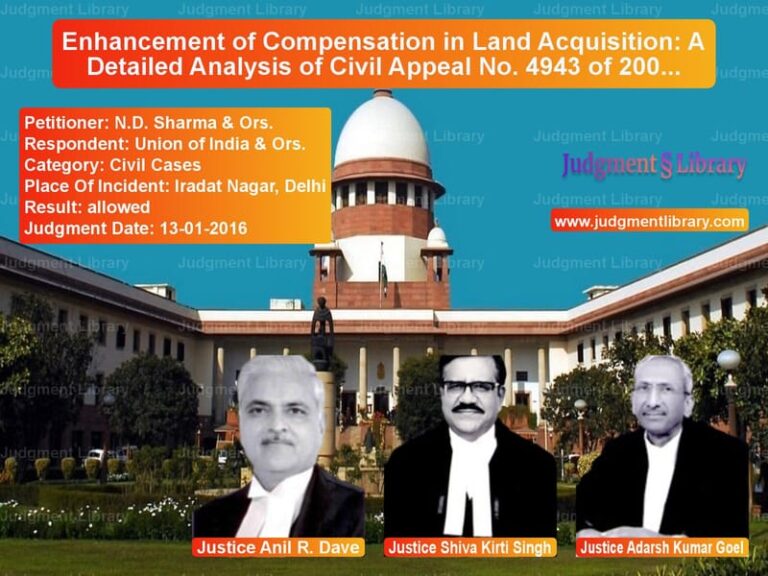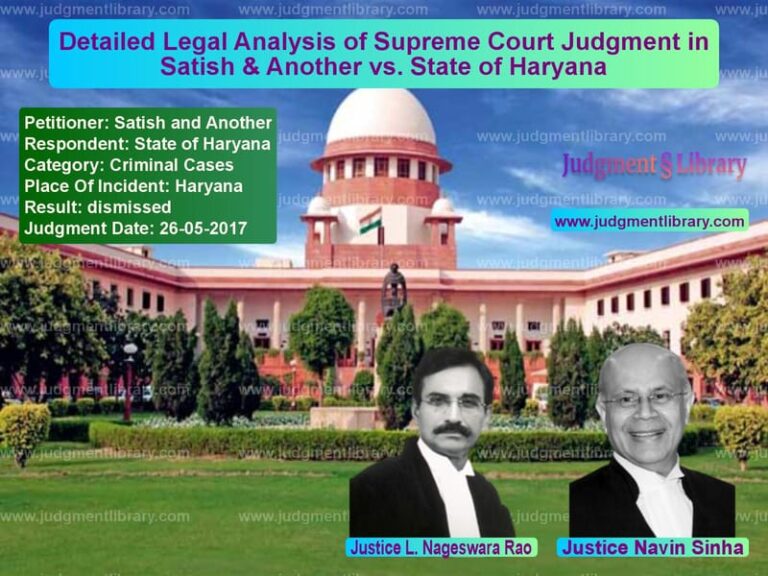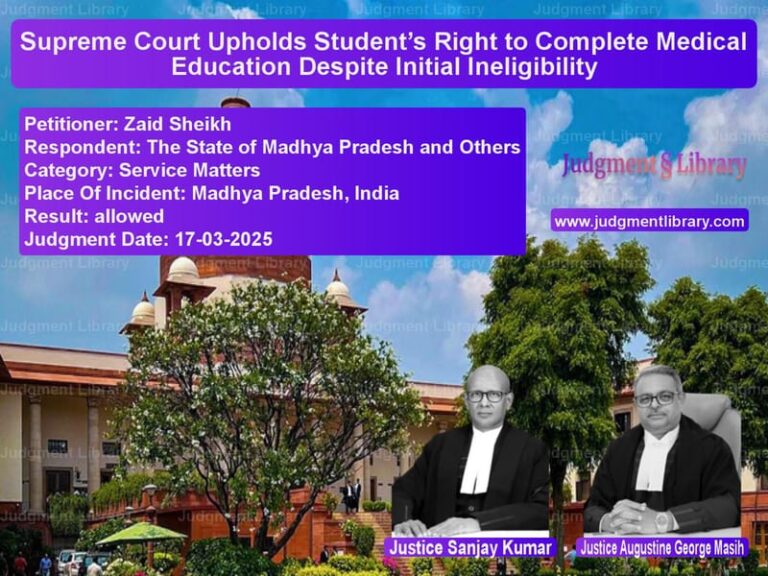Legal Implications of the Securities and Exchange Board of India’s Powers and Regulations in the Khaitan Electrical Case
The Securities and Exchange Board of India (SEBI) plays a pivotal role in regulating the financial markets in India. One of its main responsibilities is to ensure that substantial acquisitions of shares in listed companies are in compliance with the Takeover Regulations, which are designed to protect investors and maintain transparency in the market. This case involves a critical examination of SEBI’s powers under the SEBI Act and its regulations concerning substantial acquisitions of shares and takeovers. It also addresses the violation of these regulations by the individuals involved in the acquisition of shares in Khaitan Electrical Limited (KEL), a listed company. The Supreme Court of India had to examine the role of SEBI in enforcing the regulations and whether the penalties imposed on the individuals were adequate. The case also brought forward important legal issues regarding the power of SEBI to regulate acquisitions, the imposition of penalties, and the authority of the Securities Appellate Tribunal (SAT) in overturning SEBI’s decisions.
The appeal in this case centers on the violation of Regulation 10 and Regulation 11(1) of the Takeover Regulations, 1997. These regulations are crucial for ensuring that investors are fully informed of substantial acquisitions and that proper disclosures are made when the acquisition of shares crosses certain thresholds. The case revolves around the actions of Sunil Krishna Khaitan and his associates, who were accused of violating these regulations by not making the requisite public announcement for a takeover offer after acquiring a substantial number of shares in KEL.
The petitioners, SEBI, challenged the decision of the Securities Appellate Tribunal (SAT), which had partly allowed the appeal of the respondents and set aside certain directions issued by SEBI. The petitioners argued that the tribunal’s decision was contrary to the objectives of the Takeover Regulations, 1997, and that the penalty imposed was insufficient. SEBI contended that the tribunal had failed to appreciate the full scope of the regulations and had not properly considered the gravity of the violations. The petitioners further argued that the interpretation of Regulation 10 should include the combined shareholding of the acquirer and the persons acting in concert with them, as opposed to treating each acquisition individually.
The respondents, on the other hand, argued that they had fully complied with the regulations and that the delay in issuing a show-cause notice by SEBI was a valid reason for their actions. They contended that the penalty was disproportionate and that a monetary fine would have been a more appropriate response. The respondents also raised concerns about the retrospective application of the regulations and whether they had been given sufficient time to respond to the charges.
The Court’s analysis focused on the interpretation of Regulation 10 and the requirement for disclosure when an acquirer crosses the 15% threshold in a company’s shareholding. The Court reviewed the actions of the accused and their compliance with the regulations, considering whether their failure to make a public offer triggered the requirements under the regulations. The Court also examined the power of SEBI under Regulation 44 to issue directions and impose penalties in cases of non-compliance. SEBI has the discretion to direct an acquirer to make a public offer or impose monetary penalties for violations of the regulations. However, the Court emphasized that the Securities Appellate Tribunal must not substitute its own direction for SEBI’s but should instead evaluate the legality of SEBI’s actions based on the law.
Ultimately, the Court found that SEBI’s actions were justified and that the direction to make a public offer was appropriate given the violations committed by the respondents. The Court emphasized the importance of timely action by regulatory bodies in enforcing regulations and protecting investors. The decision also underscored the need for clear and consistent application of securities laws to maintain market integrity.
Petitioner Name: Securities and Exchange Board of India.Respondent Name: Sunil Krishna Khaitan and Others.Judgment By: Justice Sanjiv Khanna, Justice Bela M. Trivedi.Place Of Incident: India.Judgment Date: 10-07-2022.
Don’t miss out on the full details! Download the complete judgment in PDF format below and gain valuable insights instantly!
Download Judgment: securities-and-excha-vs-sunil-krishna-khaita-supreme-court-of-india-judgment-dated-10-07-2022.pdf
Directly Download Judgment: Directly download this Judgment
See all petitions in Company Law
See all petitions in Corporate Governance
See all petitions in Shareholder Disputes
See all petitions in unfair trade practices
See all petitions in Judgment by Sanjiv Khanna
See all petitions in Judgment by Bela M. Trivedi
See all petitions in dismissed
See all petitions in supreme court of India judgments July 2022
See all petitions in 2022 judgments
See all posts in Corporate and Commercial Cases Category
See all allowed petitions in Corporate and Commercial Cases Category
See all Dismissed petitions in Corporate and Commercial Cases Category
See all partially allowed petitions in Corporate and Commercial Cases Category

